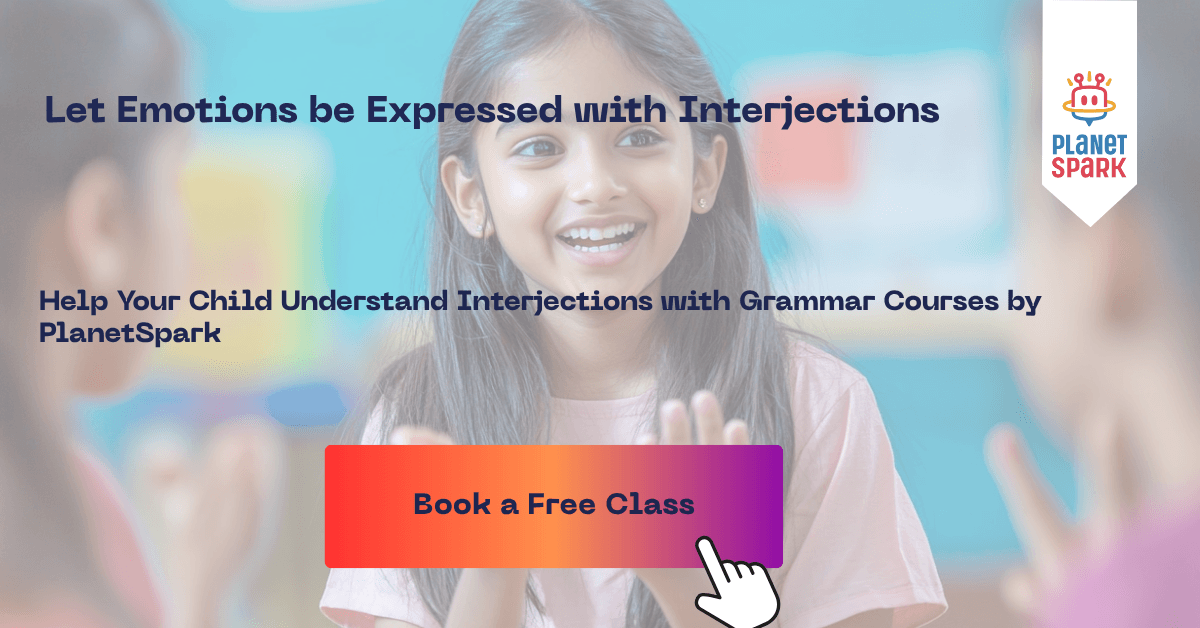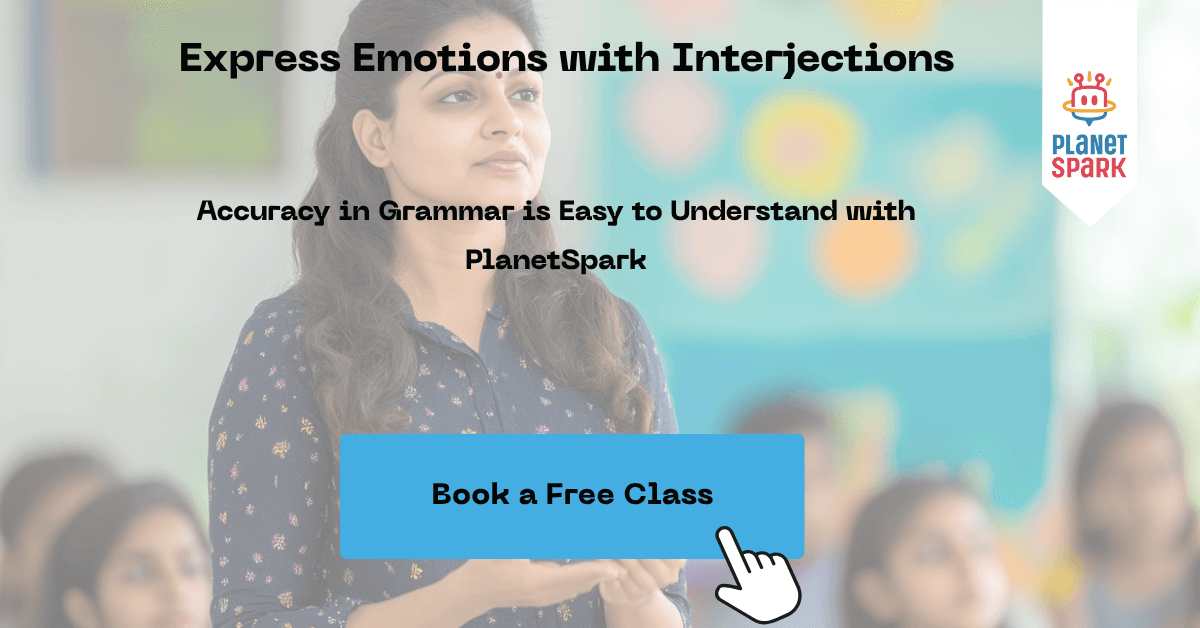Learn Interjections for Class 4 Kids with Examples & Rules

Table of Contents
- What is an Interjection?
- Types of Interjections
- Rules for Using Interjections
- Usage of Interjections in Sentences
- PlanetSpark’s Learning Features for English Grammar
- More About Interjections for Class 4
- Additional Information About Interjections and PlanetSpark's
- Conclusion
- Frequently Asked Questions (FAQs)
Interjections are short and powerful words or phrases used to express sudden emotions such as excitement, surprise, anger, fear, or joy. They often appear at the beginning of a sentence and are commonly followed by an exclamation mark to emphasise the emotion. These expressions help make conversations more natural, dynamic, and emotionally engaging. For Class 4 students, understanding how to use interjections properly can significantly enhance both spoken and written communication by adding clarity and emotional tone to their language.
At PlanetSpark, our English Grammar Course for Class 4 helps young learners explore interjections through engaging, interactive lessons. The course uses storytelling, real-life examples, and fun grammar games to help students understand and practise using interjections confidently. With the support of expert trainers, AI-powered feedback tools, and a personalised curriculum, children not only master grammar rules but also learn to express themselves fluently and effectively.
What is an Interjection?
An interjection is a part of speech that is used to show sudden emotions or feelings. It can be a word, a short phrase, or even a sound. Interjections stand apart from the rest of the sentence and often appear at the beginning of a sentence. They are usually followed by an exclamation mark (!) or a comma depending on the intensity of the emotion.
Examples:
- Ouch! That hurts.
- Oh, I didn’t know that.
These expressions are vital for making conversations feel more real and relatable, particularly in informal or spoken contexts.

Types of Interjections
- Primary Interjections
- These are words that function solely as interjections and do not belong to any other part of speech.
- Examples: Alas! Hurray! Wow!
- Secondary Interjections
- These are words from other parts of speech (like nouns or adjectives) that function as interjections in specific contexts.
- Examples: Goodness! Oh dear! My word!
- Volitive Interjections
- Used to express commands, requests, or desires.
- Examples: Shh! Hush! Look!
- Emotive Interjections
- Used to convey emotions such as happiness, sorrow, anger, or fear.
- Examples: Yippee! Ouch! Aww!
- Cognitive Interjections
- Express thoughts, realisations, or mental reactions.
- Examples: Hmm, Uh-oh, Aha!
- Mild Interjections
- Convey soft or less intense feelings and are usually followed by a comma instead of an exclamation mark.
- Examples: Well, Oh, Hmm,
- Strong Interjections
- Reflect intense emotions and are typically followed by an exclamation mark.
- Examples: Wow! Hurray! Yikes!
PlanetSpark’s English Grammar Course helps Class 4 students master all types of interjections through structured activities, real-time feedback, and expert instruction. Book a free trial class to experience this engaging approach firsthand.
Rules for Using Interjections
Rule 1: Interjections Highlight Emotions
Interjections often convey emotions like joy, sorrow, surprise, etc. In informal settings, strong interjections are common. Example:
- Aw, I wanted to go too.
Rule 2: Some Interjections Are Non-Verbal Sounds
Interjections like “uh,” “um,” and “er” are just vocal sounds and not proper words. Example:
- Your, um, notebook is on the table.
Rule 3: They May Indicate Agreement or Disagreement
Interjections are also used to affirm or deny. Example:
- Yes! I agree.
- No! That’s not right.
Rule 4: They Can Draw Attention
Some interjections are meant to grab someone’s attention. Example:
- Yo, come here!
PlanetSpark’s grammar curriculum ensures that Class 4 learners grasp the usage of interjections through engaging activities and guided speaking practice. Book your child’s free trial class now to experience it firsthand.

Usage of Interjections in Sentences
Here are more examples with explanations:
- Oops! I stepped on your foot. (Expresses apology or surprise)
- Wow! What a beautiful sunset. (Expresses admiration)
- Alas! The hero died. (Expresses sorrow)
- Yay! We’re going on vacation. (Expresses joy)
- Darn! I forgot my homework. (Expresses frustration)
Curious about how PlanetSpark supports grammar learning? Explore our live classes, digital tools, and trainer-led lessons. Sign up for a free trial class today.
PlanetSpark’s Learning Features for English Grammar
1:1 Personal Trainers for Every Child
Every student at PlanetSpark is paired with a certified communication expert who:
- Understands the child’s learning style and pace
- Gives instant feedback during sessions
- Builds fluency, public speaking, storytelling, grammar, and writing skills
- Ensures stronger engagement and personalised learning
Personalised Curriculum and Learning Roadmap
Each child follows a unique learning plan tailored to:
- Fill gaps in grammar, vocabulary, and fluency
- Improve public speaking and writing from basics to advanced
- Evolve based on milestones and trainer feedback
SparkX – AI Video Analysis Tool
Children upload their speeches and storytelling videos. The AI tool analyses:
- Voice clarity
- Posture and body language
- Grammar and structure
- Confidence and idea flow
AI-Led Practice Sessions
Students engage with AI-led activities that include:
- Storytelling and speech delivery
- Real-time feedback on grammar and fluency
- Consistent and independent practice
Spark Diary – Digital Writing Journal
Encourages children to:
- Reflect daily in their digital journals
- Write creative stories and structured essays
- Develop strong writing habits
Gamified Learning Approach
Fun learning through:
- Quizzes and vocabulary games
- Grammar challenges
- Daily revision through interactive modules
Structured Parent-Teacher Meetings
Regular updates for parents through:
- Performance reviews
- Discussion on learning goals and challenges
- Action plans for progress
Comprehensive Progress Reports
Evaluating children on:
- Grammar, vocabulary, confidence, and clarity
- Voice modulation and content flow
- Trainer insights and targeted feedback
Learning Clubs and Communities
Interactive clubs include:
- Debate Club
- Story Writing Club
- Podcasting Club
- Speech and Poetry Circles
- Writers Guild
Sparkline – A Safe Platform to Share Work
Children share their:
- Videos, poems, and stories
- Comment on peer work safely
- Build digital confidence and expression
Contests and Real-Time Recognition
PlanetSpark offers:
- Regular storytelling, writing, and speaking contests
- Talent showcases and open mics
- Certificates and prizes
SparkBee
An interactive grammar, spelling, and vocabulary platform for:
- Daily quizzes
- Fun challenges
- Consistent practice
SparkShop
A digital eBook store offering:
- Grade-wise books on reading and grammar
- Creative writing, vocabulary, and more
- Budget-friendly, easy-to-read material
Explore the full potential of your child's communication skills by enrolling them in PlanetSpark’s English Grammar Course for Class 4. Start with a free trial class and watch your child build confidence and accuracy in grammar.
More About Interjections for Class 4
- Interjections can vary in tone and intensity:
- Mild interjections like “Oh,” “Well,” or “Hmm” signal thoughtful pauses or gentle surprise.
- Strong interjections like “Wow!” or “Yikes!” convey powerful, spontaneous emotions.
- Practising both types helps children become expressive and tone-aware in speaking and writing.
- Teachers and parents can reinforce interjections through activities:
- Role-playing scenarios such as receiving a surprise or reacting to a story.
- Creative writing tasks like comic strips or dialogue-based stories for contextual usage.
- Help children observe interjections in literature and conversation:
- Encourage reading short stories or watching age-appropriate shows to find interjections.
- Create a “Grammar Scrapbook” for writing down and reflecting on interjections they encounter.
- Understanding punctuation with interjections improves grammar:
- Exclamation marks are typically used with strong emotions.
- Commas may be used for milder or more formal expressions.
- Learning this distinction enhances clarity and grammatical precision.
Build strong grammar habits early—join PlanetSpark’s English Grammar Course for Class 4 and try a free trial class today.
Additional Information About Interjections and PlanetSpark's English Grammar Courses
- Interjections serve more purposes than expressing emotions:
- Words like “Well,” “So,” and “Hey” are used to introduce topics, transition between ideas, or get attention.
- Teaching these aspects helps Class 4 students become more articulate and confident in both academic and casual conversations.
- PlanetSpark's approach to teaching interjections:
- Goes beyond memorisation and includes broader communication training.
- English Grammar Courses integrate grammar with speaking, writing, and comprehension development.
- Real-life simulations, digital tools, and interactive games bring grammar concepts to life.
- Practical application in every session:
- Students practise interjections in written exercises and also through storytelling, impromptu speeches, and conversations.
- This blended method ensures better retention and greater student confidence.
- Parent involvement and guidance:
- Structured progress reports and goal-setting help parents track development.
- Interactive home activities support learning beyond the classroom.
See the difference PlanetSpark can make—enrol in the English Grammar Course for Class 4 and start with a free trial class today.
Conclusion
Interjections play a key role in making language expressive and relatable. For Class 4 students, learning about interjections not only improves their grammar but also enhances their ability to communicate emotions effectively. Understanding the types, characteristics, and usage of interjections can significantly elevate both spoken and written English. PlanetSpark’s engaging and structured learning environment ensures that students grasp these concepts with ease and apply them confidently in real life.
Frequently Asked Questions (FAQs)
Q1: Give and explain one type of Interjection A1: Primary Interjections – These are words that are used solely as interjections and do not belong to any other part of speech. Example: Alas! The race is over.
Q2: Give one example of an Interjection A2: Oh my God! That was a dangerous accident. (‘Oh my God’ is the interjection.)
Q3: Define Interjection A3: Interjections are words used to represent a feeling or sudden emotion.
Q4: How are Interjections represented in English Grammar? A4: Interjections are generally followed by an exclamation mark (!) to show emotion.
Q5: What is the difference between an Interjection and an Exclamation? A5: An interjection is usually a short expression like a single word or phrase, while an exclamation can be a longer sentence expressing strong feelings.
Q6: Identify the Interjection – Aww! You are so cute. A6: ‘Aww’ is the interjection in the sentence.
Personalized Communication Report
Record a video to get a AI generated personalized communication report for your child

Hi There, want to try these
tips for your child with
LIVE with our expert coach?
Let's check your child's
English fluency
